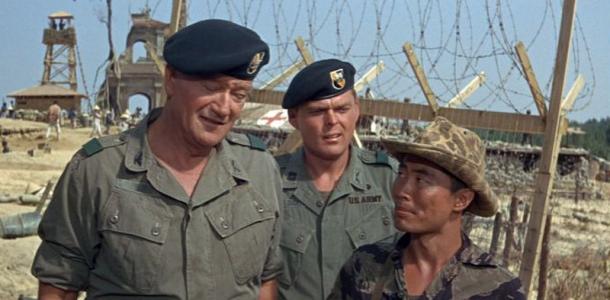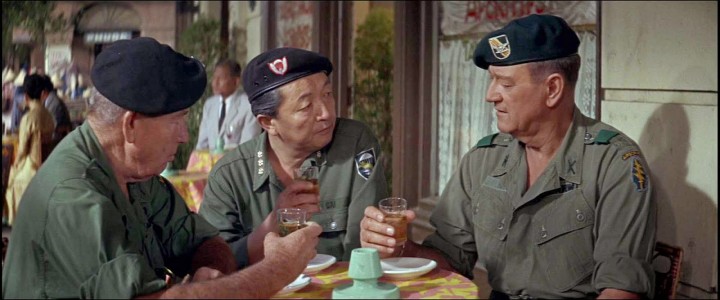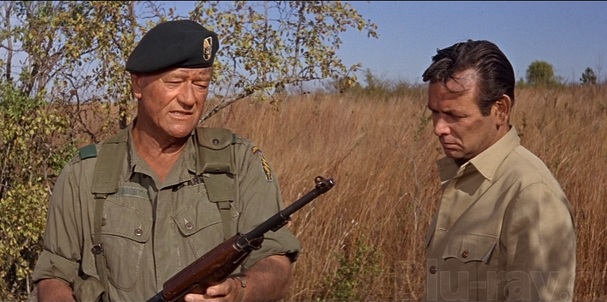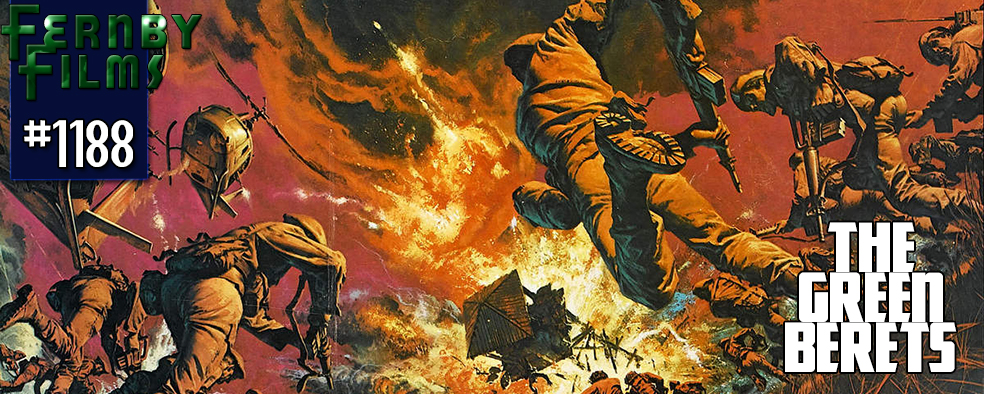Movie Review – Green Berets, The
Director : John Wayne + Ray Kellog
Year Of Release : 1968
Principal Cast : John Wayne, Jim Hutton, David Janssen, Aldo Ray, Raymond St Jaques, Bruce Cabot, Jack Soo, George Takei, Patrick Wayne, Luke Askew, Irene Tsu, Edward Faulkner, Jason Evers, Mike Henry.
Approx Running Time : 141 Minutes
Synopsis: Col. Mike Kirby picks two teams of crack Green Berets for a mission in South Vietnam. First off is to build and control a camp that is trying to be taken by the enemy, while the second mission is to kidnap a North Vietnamese General.
*******
Apocalypse Has-been.
Oh my goodness. Oh, my actual goodness. John Wayne’s passion film about the Vietnam War, 1968’s The Green Berets, is awful. Is it propaganda? Is it some weird recruiting piece? Who knows – or cares – because the film rankles the intellect, even taking into account the time in which it was made. Terribly scripted and dreadfully acted by almost everyone appearing on the screen, The Green Beret’s patriotic portrayal of soldiers in America’s clusterf@ck war in ‘Nam is built purely as a way for Wayne, who not only co-directs, but stars as well in a role that’s built for his particular breed of masculinity, to make his celebrity point known to all. In many ways, it’s a precursor to Michael Bay’s military-porn aesthetic, only without the misogyny or the transforming robots. The Green Berets runs nearly 2 and a half hours, and feels a lot like many more; plodding, simplistic, devoid of the very passion Wayne so obviously hoped to imbue within it, it’s just a really shitty film.
 The Green Berets is a “mission” film ostensibly – Wayne plays Colonel Mike Kirby, who leads two teams of specialised soldiers to hold down a supply base-camp in Vietnam, and also capture an enemy commander, but this ain’t Apocalypse Now. Not even close. The action, such as it is, suits Wayne’s cowboy persona, while the story echoes much of the Western genre’s black-and-white depiction of conflict – Vietnam was a quagmire of political and public opinion, both within the United States and without: at the time the film was made, sentiment was rising that suggested the public was tired of what was being portrayed as an “unwinnable” war, and questions were being asked as to why the United States was even involved. Wayne, staunchly anti-communist, made The Green Berets a “statement” film, intimating that the American military should be supported in the war because to do so would let the scourge of communism slowly take over the world.
The Green Berets is a “mission” film ostensibly – Wayne plays Colonel Mike Kirby, who leads two teams of specialised soldiers to hold down a supply base-camp in Vietnam, and also capture an enemy commander, but this ain’t Apocalypse Now. Not even close. The action, such as it is, suits Wayne’s cowboy persona, while the story echoes much of the Western genre’s black-and-white depiction of conflict – Vietnam was a quagmire of political and public opinion, both within the United States and without: at the time the film was made, sentiment was rising that suggested the public was tired of what was being portrayed as an “unwinnable” war, and questions were being asked as to why the United States was even involved. Wayne, staunchly anti-communist, made The Green Berets a “statement” film, intimating that the American military should be supported in the war because to do so would let the scourge of communism slowly take over the world.
Regardless of the motivations in making The Green Berets, there’s no discernible reason why the film needed to be this clumsy, this malignantly awful. As a statement film, it wears its heart on its sleeve. Wayne provides the square-jawed rah-rah US-is-right narrative, while poor David Janssen, as newspaper reporter George Beckworth, is cast as the disbelieving, cynical anti-war type who, by his being in Vietnam, is taught a lesson in war. The simplistic way the film depicts the war’s “sides” reduces the combatants to generic Good Guys and Bad Guys; it’s very cowboys and indians, yes, with almost every scene involving reiterating just how evil and nasty the North Vietnamese are in the war, unrelentingly avoiding areas of grey to give the film, and Beckworth’s gradual realisation that the US needs to be in Vietnam is accompanied by savage actions by the enemy, a counterpoint to the argument against it.
 There really isn’t any argument, though. The Green Berets is so obviously aimed at making the US, and by extension their presence in ‘Nam, look good, it eschews narrative culpability for a one-sided, chest-thumping exercise in flag-waving. It would appear that many of the supporting cast in the film are, or were, servicemen at some point, given the acting in this film ranges from ordinary to god-awful, while spotting talent like George Takei, as Captain Nim, and regular Wayne ensemble player Bruce Cabot, as Colonel Morgan, is a blessing for a film so destitute in credibility.
There really isn’t any argument, though. The Green Berets is so obviously aimed at making the US, and by extension their presence in ‘Nam, look good, it eschews narrative culpability for a one-sided, chest-thumping exercise in flag-waving. It would appear that many of the supporting cast in the film are, or were, servicemen at some point, given the acting in this film ranges from ordinary to god-awful, while spotting talent like George Takei, as Captain Nim, and regular Wayne ensemble player Bruce Cabot, as Colonel Morgan, is a blessing for a film so destitute in credibility.
The Green Berets is mired in such rank, overcooked dialogue and atrocious acting, it’s a wonder the film made any money back at all. Wayne struts through the film and lords it over all without once breaking into anything you’d call “a character” – he plays himself, something I think he did most of his career – while the schlock-wave (correct spelling) of a supporting cast, from Jim Hutton, Aldo Ray, Jack Soo and Patrick Wayne (real-life son of John), are uniformly terrible in their respective roles. The script is so hokey, so chock-full of dire dialogue and technical military jargon, and the acting so poor, at times the film feels like a volunteer recreation of the war rather than an expensive Hollywood-backed production. Not to mention the rampant subversive racism – every time the film’s token Vietnamese orphan, Ham Chunk (Craig Jeu) appears on the screen in what I expected was the obligatory “cute” character, they play oriental music as an accompaniment, as if somehow reinforcing to the audience that yeah, this kid is Asian. Ugh, give me a break.
 I watched The Green Berets simply because it occurred to me that I needed to see more than a few John Wayne films as part of my quest to view older Hollywood films. Plundering every war cliché known to man, the film’s clumsy direction, tone-deaf performances and brazenly jingoistic message are acutely dire. As a war film it lacks grace or emotional weight, even by 1960’s standards, although it does aim for it at least, and the whitewashed, gee-willikers GI Joe nature of what Wayne and co-director Ray Kellog (as well as an uncredited Mervyn LeRoy) attempt lands on the screen with a dull thud. Indeed, The Green Berets is just that: hopelessly dull. Although one can’t despise the attempt to depict US forces as brave and valiant men and women (although there are no female characters of note in this film), the film’s odious one-note drum-strum and iniquitous motivational sequestration make for a very hard slog. Not even John Wayne’s all-American persona can salvage this from bombing, and badly.
I watched The Green Berets simply because it occurred to me that I needed to see more than a few John Wayne films as part of my quest to view older Hollywood films. Plundering every war cliché known to man, the film’s clumsy direction, tone-deaf performances and brazenly jingoistic message are acutely dire. As a war film it lacks grace or emotional weight, even by 1960’s standards, although it does aim for it at least, and the whitewashed, gee-willikers GI Joe nature of what Wayne and co-director Ray Kellog (as well as an uncredited Mervyn LeRoy) attempt lands on the screen with a dull thud. Indeed, The Green Berets is just that: hopelessly dull. Although one can’t despise the attempt to depict US forces as brave and valiant men and women (although there are no female characters of note in this film), the film’s odious one-note drum-strum and iniquitous motivational sequestration make for a very hard slog. Not even John Wayne’s all-American persona can salvage this from bombing, and badly.











